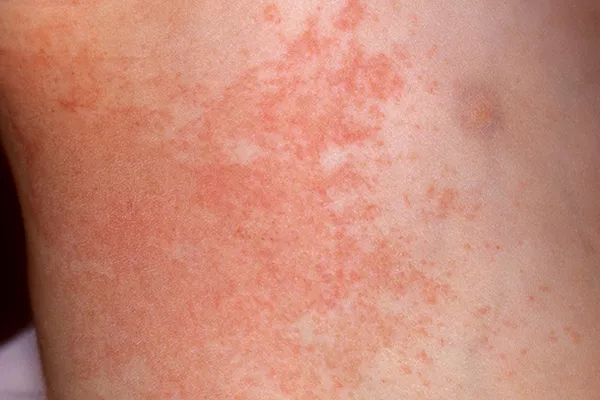Eczema is a common skin condition that affects millions of people worldwide. While it can appear on any part of the body, the thighs are a particularly sensitive area where eczema often manifests.Understanding the causes of eczema on the thighs can help in its prevention and treatment. This article will explore the various factors that contribute to eczema on the thighs and provide practical solutions for managing this condition.
SEE ALSO: How to Treat Eczema in a 4-Month-Old
1.Eczema Definition
Eczema, also known as dermatitis, is a chronic inflammatory skin condition characterized by red, itchy, and dry patches on the skin. It can vary in severity, with symptoms ranging from mild irritation to severe discomfort.
Types of eczema
Atopic Dermatitis: The most common form of eczema, often associated with a family history of allergies, asthma, or hay fever. It typically appears in early childhood and can persist into adulthood.
Contact Dermatitis: Caused by direct contact with an irritant or allergen, leading to localized skin inflammation.
Nummular Eczema: Characterized by coin-shaped patches on the skin, often triggered by dry skin or allergens.
Dyshidrotic Eczema: Appears as small, itchy blisters, primarily on the hands and feet but can also affect the thighs.
Prevalence:
Eczema is a widespread condition, affecting approximately 10-20% of children and 1-3% of adults globally. While it can occur anywhere on the body, the thighs are a common site, especially in individuals who engage in activities that cause friction or wear tight clothing.
2. Common Causes of Eczema on Thighs
Internal Factors:
Genetics:
Eczema often runs in families, suggesting a genetic predisposition. If a close family member has eczema, asthma, or hay fever, the likelihood of developing eczema is higher. This genetic link may also influence the severity and location of eczema on the body.
Immune System:
A malfunctioning immune system plays a significant role in eczema. In some cases, the immune system may overreact to harmless substances, leading to inflammation and the characteristic symptoms of eczema. A weakened immune system may also make the skin more susceptible to infections and irritations.
Underlying Medical Conditions:
Certain medical conditions can exacerbate eczema or trigger its onset, especially on the thighs. Allergies, asthma, and food intolerances are common culprits. For example, an allergy to a particular food may cause a flare-up of eczema on the thighs, particularly in individuals with sensitive skin.
External Factors:
Irritants:
Exposure to irritants is a leading cause of eczema on the thighs. Harsh soaps, detergents, and certain skincare products can strip the skin of its natural oils, leading to dryness and irritation. Tight clothing, especially those made from synthetic fabrics, can also rub against the skin, causing friction and exacerbating eczema.
Allergens:
Allergens such as pollen, dust mites, pet dander, and certain foods can trigger eczema flare-ups. When these allergens come into contact with the skin or are ingested, they can provoke an immune response, leading to inflammation and itching on the thighs.
Environmental Factors:
Climate, humidity, and temperature changes can significantly impact eczema. Cold, dry air can strip moisture from the skin, while hot, humid conditions can cause sweating and irritation. Both extremes can lead to flare-ups on the thighs, especially if the skin is already sensitive.
Friction or Pressure:
Activities like cycling, running, or wearing tight pants can create friction or pressure on the thighs, leading to irritation and the development of eczema. The repeated rubbing of skin against fabric or equipment can break down the skin’s protective barrier, making it more vulnerable to eczema.
3. Potential Triggers Specific to Thighs
Shaving:
Shaving the thighs can irritate the skin, particularly if done without proper preparation or care. The use of dull razors, shaving in a hurry, or skipping moisturizing can leave the skin on the thighs prone to nicks, cuts, and inflammation, leading to eczema.
Clothing:
Certain fabrics, especially synthetic or tight-fitting ones, can trap moisture and cause friction, creating a perfect environment for eczema to develop. Wearing breathable fabrics like cotton and ensuring a proper fit can help reduce the risk.
Hygiene:
Proper hygiene is crucial for managing eczema on the thighs. Using harsh soaps or detergents can strip the skin of its natural moisture, leading to dryness and irritation. A gentle skincare routine with mild, fragrance-free products can help maintain the skin’s health and prevent eczema flare-ups.
4. Solutions and Management
General Eczema Treatment:
There are several over-the-counter and prescription treatments available for managing eczema. These include:
Moisturizers: Regular use of emollient-rich moisturizers can help keep the skin hydrated and reduce the frequency of flare-ups.
Topical Corticosteroids: These anti-inflammatory creams or ointments can reduce redness, swelling, and itching during an eczema flare-up.
Antihistamines: Oral or topical antihistamines can help alleviate itching and improve sleep, especially during severe flare-ups.
Light Therapy: Phototherapy, using ultraviolet light, can be beneficial for individuals with chronic eczema that does not respond well to other treatments.
Specific Tips for Managing Eczema on Thighs:
Moisturize Regularly:
Moisturizing the thighs frequently, especially after bathing, can help lock in moisture and prevent dryness, which is a common trigger for eczema.
Avoid Triggers:
Identifying and avoiding specific irritants or allergens that trigger eczema is crucial. This may involve changing skincare products, laundry detergents, or even modifying your diet to eliminate potential triggers.
Gentle Skincare:
Use mild, fragrance-free cleansers and skincare products to avoid irritating the sensitive skin on the thighs. Avoid scrubbing the skin too harshly during washing or drying.
Conclusion
Understanding the causes of eczema on the thighs is essential for effective management. By recognizing the internal and external factors that contribute to this condition and adopting appropriate skincare and lifestyle habits, individuals can significantly reduce the frequency and severity of eczema flare-ups on the thighs.
Related Topics:

























